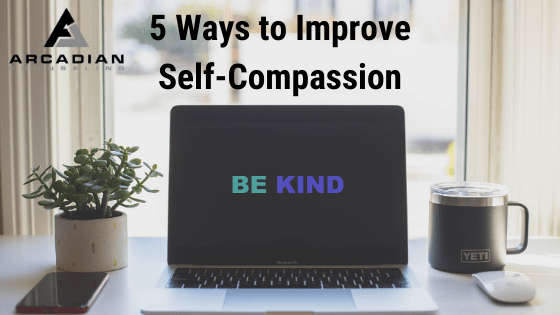Self-compassion is something I preach to clients on a regular basis. But it’s something that I’ve always struggled with. As we all face great uncertainty in the future, now more than ever, I’m trying to practice what I preach. But it’s difficult. For most of my life, I’ve struggled with the belief that nothing I’ve done is good enough. No one has ever been harder on me than myself.
This is also a familiar story I hear from clients.
If you’re lucky, you were brought up to always be kind to others. But how many of us were taught to be kind to ourselves? Self-compassion, or self-love, can often seem like a foreign concept, particularly to those raised in an abusive or a loving home. I heard somebody once say, “If you think you’re kind, spend a day listening to how you talk to yourself – then you’ll see just how kind you really are.”
If you aren’t kind to yourself, how can you be authentically kind to others?
Self-compassion and self-love are not to be confused with arrogance or conceit – usually indicators of a lack of self-love. Self-compassion has nothing to do with superiority and everything to do with being kind and gentle with yourself. It allows us to treat ourselves as we do our greatest loved ones. Instead of harshly judging ourselves for our shortcomings, we can instead give ourselves unconditional love and acceptance.
Why is Self-Compassion Important?
Over the last decade, research has found a direct correlation between self-compassion and psychological well-being. Self-compassion leads to better social connectedness, emotional intelligence, happiness, and overall life satisfaction. Self-compassion helps us recognize the difference between making a bad choice and being a bad person. Self-compassion also leads to less depression, anxiety, shame, and fear of failure.
A lack of self-compassion can take a toll on our personal and romantic relationships. How we treat ourselves is typically an indicator of how we let others treat us. The less love and compassion we have for ourselves, the more likely we end up in abusive and dysfunctional relationships. But, when we have self-compassion, we are less likely to depend on others to validate our self-worth or “complete us.”
Here are three ways you can begin practicing self-compassion immediately:
Develop acceptance (even for your flaws)
Many people make the mistake of believing that because you accept something, it means you like it. Not true. We all have things about ourselves we don’t love, but the more we focus on accepting the things we cannot change, the more content we become with who we are.
I have struggled for most of my life to accept that I am an introvert and a highly sensitive person, and tried to be something I am not. Accepting my true nature, has been my greatest act of self-compassion. Self acceptance has allowed me to focus my energy and attention on the things that I care about the most and the things that nurture my soul. It’s allowed me stop beating myself up for being someone I’m not – or someone others expect me to be.
Do What You Love
Engaging in pleasurable activities can be viewed as something we don’t deserve if we struggle with guilt and shame. It can make us feel selfish. Prior to becoming a father, guilt was not an emotion I struggled with. Now it shows up on a regular basis. I feel guilty when I’m working, and not with my kids. I feel guilty if I’m doing something I enjoy like exercising or reading, and not spending time with my kids. I feel guilty for wanting time to myself to recharge.
The problem is, I wasn’t able to enjoy any of those things – because of the narrative I told myself. However, allowing yourself to to take time in your life to do something you truly enjoy, is an act of self-compassion. Only when I changed the narrative, was I able to enjoy those activities, and ironically, enjoy my time with my kids more.
Treat Yourself Like You Would A Child
Most of us wouldn’t treat a child the way we treat ourselves. You wouldn’t call a child stupid for making a poor decision (at least you better not!). You wouldn’t tell them they aren’t worthy of love and will be alone forever. Yet many of us say things like this to ourselves all the time.
It can be hard to change our inner dialogue at first. But with a mindful approach, make the choice to treat yourself just like you would a small child. For some, it’s helpful to imagine the 3 year old version of yourself and ask yourself, “What would I say to them in this situation?”
Practice Mindfulness
Self-criticism is a mental habit. In order to replace self-criticism with self-compassion, we must practice mindfulness. When you catch yourself caught up in the negative mind-chatter, stop and take a deep breath. Focus your thoughts on something positive about yourself. What qualities do you like about yourself? What have you done recently to feel proud about? It can be anything like, “I am always on time,” or “I made the cashier smile today.”
If you do find yourself having negative thoughts (and you will because you’re human), DO NOT chastise yourself for having them. Simply recognize them, acknowledge that you no longer need them, that they aren’t helping you, and send them on their way to make room for positivity.
Allow Yourself to Be Human
At the end of the day, self-compassion is about being OK with your own humanity. It’s important to recognize that being human means being flawed. You, me, and everyone else has imperfections. When I finally let go of the need to be perfect, life became so much easier. I acknowledge my own flaws on a regular basis with acceptance and sometimes laughter. If you can’t laugh at yourself, life can be a lot harder than it needs to be. Allow yourself permission to make mistakes and accept yourself as you are. You’ll be pleasantly surprised how much lighter and happier you’ll feel.
It’s important to learn self-compassion, but it’s not easy cultivating new thought patterns on your own. It can be tough to learn self-compassion. I know – because I still struggle with it. A therapist or coach can assist you with creating the insight and awareness needed to help notice your thoughts and feelings, have a realistic perspective of yourself and others, and learn to practice empathy for yourself. With time and practice you can learn how to internalize these skills and integrate them into daily life.
Are you struggling with how to improve your self-compassion? How to improve self-esteem? How to improve self-confidence? We can help. Contact us today for a free consultation.
James Killian, LPC is the Principal Therapist & Owner of Arcadian Counseling in New Haven, CT where they specialize in helping over-thinkers, high achievers, and perfectionists take control and move From Surviving to Thriving.





